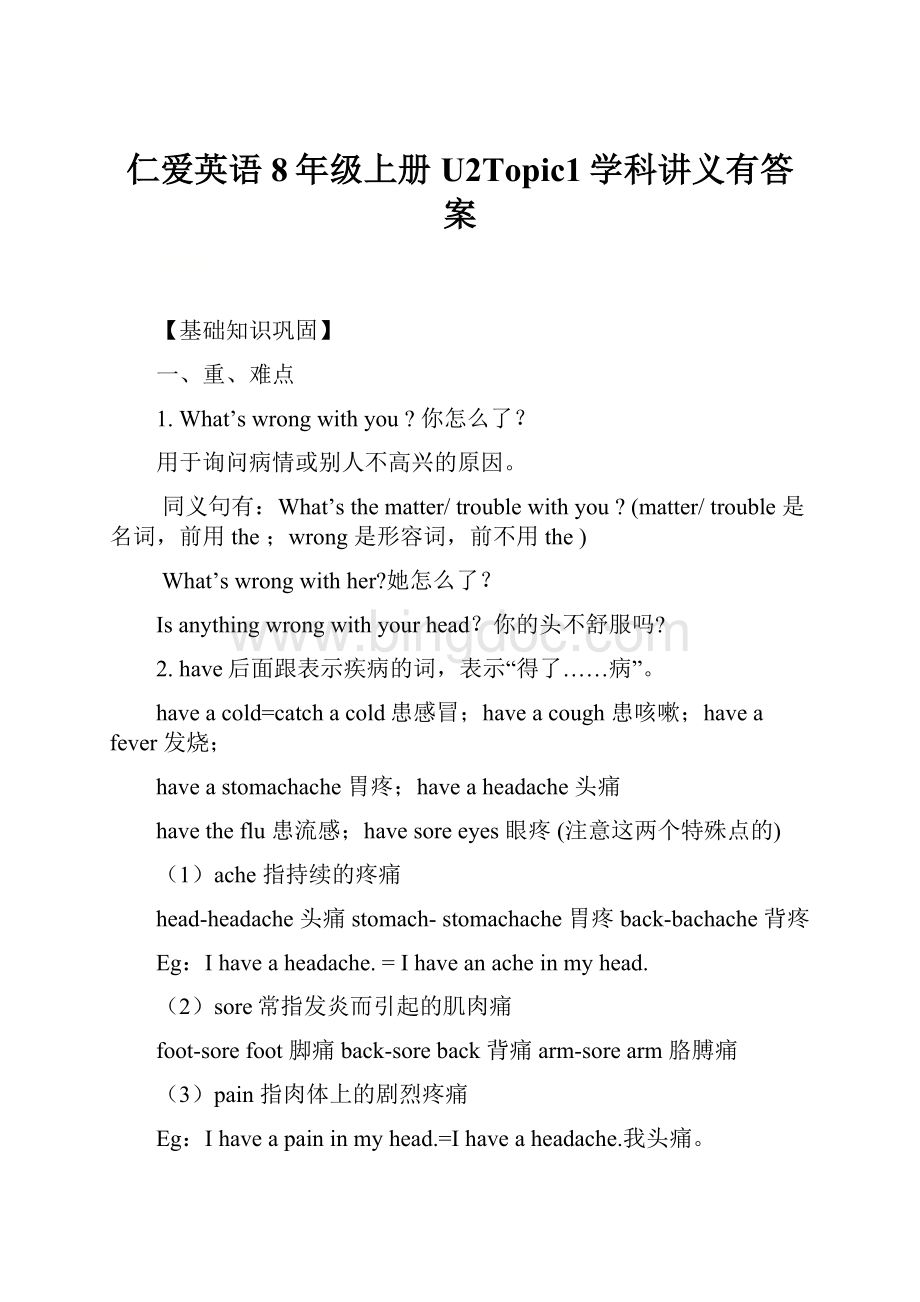仁爱英语8年级上册U2Topic1学科讲义有答案.docx
《仁爱英语8年级上册U2Topic1学科讲义有答案.docx》由会员分享,可在线阅读,更多相关《仁爱英语8年级上册U2Topic1学科讲义有答案.docx(15页珍藏版)》请在冰点文库上搜索。

仁爱英语8年级上册U2Topic1学科讲义有答案
【基础知识巩固】
一、重、难点
1.What’swrongwithyou?
你怎么了?
用于询问病情或别人不高兴的原因。
同义句有:
What’sthematter/troublewithyou?
(matter/trouble是名词,前用the;wrong是形容词,前不用the)
What’swrongwithher?
她怎么了?
Isanythingwrongwithyourhead?
你的头不舒服吗?
2.have后面跟表示疾病的词,表示“得了……病”。
haveacold=catchacold患感冒;haveacough患咳嗽;haveafever发烧;
haveastomachache胃疼;haveaheadache头痛
havetheflu患流感;havesoreeyes眼疼(注意这两个特殊点的)
(1)ache指持续的疼痛
head-headache头痛stomach-stomachache胃疼back-bachache背疼
Eg:
Ihaveaheadache.=Ihaveanacheinmyhead.
(2)sore常指发炎而引起的肌肉痛
foot-sorefoot脚痛back-soreback背痛arm-sorearm胳膊痛
(3)pain指肉体上的剧烈疼痛
Eg:
Ihaveapaininmyhead.=Ihaveaheadache.我头痛。
注意:
havetheflu患流感
have表示“吃”时,havebreakfast/supper/dinner/lunch,中间不能有冠词,但have后面的名词有形容词修饰时,可加冠词。
haveabigdinner.吃一顿丰盛的正餐。
3.Youlookpale.
系动词有:
be是;look看起来,smell闻起来,sound听起来,taste尝起来,feel觉得,turn/get/become变;他们后常接形容词作表语,系动词常可用动词be来替换。
如:
Themusicsoundswonderful.=Themusiciswonderful.
Youlookyoung.=Youareyoung.
4.Idon’tfeellikeeating.
feellike“想要”,后面通常跟名词、代词、动名词。
如:
Ifeellikerunning.
近义词组wanttodosth./wouldliketodosth.
Iwanttotakethesebookstotheclassroom.
Iwouldliketoeatsomehotdogs.
5.You’dbetternoteattoomuchcandy.
(1)toomuch修饰不可数名词,还可以用来修饰动词,如:
①toomuchmoney;②Stayinbedanddon’tmoveyourlegtoomuch.
(2)toomany修饰可数名词复数,如:
toomanystudents
(3)muchtoo修饰形容词或副词,如:
muchtooexpensive
6.Letmecheckitover.
checkover=lookover检查正误,检查身体如:
①Canyoucheckovermyhomework.
②Thedoctorcheckedheroverandshewasfine.
7.SoI’dlikeaskforaweek’sleave.
(1)askforaleave请假
(2)askforaweek’sleave请一周的假(3)askthreedays’leave=askathree-dayleave
如:
Wecanonlytakeathree-dayleave.=Wecanonlytakethreedays’leave.
8.IhopeI’llgetwellandreturntoschoolsoon.
(1)returnto+某地=go/comebackto…表返回某地,如:
KangkangreturnedtoBeijing.
(2)returnsth.tosb.=givebacksth.tosb.表归还某物给某人,如:
Youmustreturnittomesoon.=Youmustgiveitbacktomesoon.
9.Icouldn’treadituntiltoday.
否定句+until... 表不能做某事,直到什么时候才能做。
如:
Ican’thelpyouuntilyoutellmethetruth.我不能帮助你,直到你告诉我真相我才帮你。
Youcan’twatchTVuntilyoufinishyourhomework.你不能看电视,直到你做完作业。
10.Mysisterisalsosick.
Sick和ill都表“病的“,但sick即可以作定语也可以作表语,如:
①asickgirl;②Thegirlissick.而ill只能作表语,如:
Thegirlisill.
重点短语:
takearest=havearest休息一下
takesomemedicine=havesomemedicine服药
dayandnight日日夜夜
liedown躺下
brushone’steeth刷牙(tooth的复数teeth)
haveanaccident发生一场事故
stayinbed待在床上
plentyof=alotof许多的;大量的,可接可数名词的复数或不可数名词
worryaboutsth./sb.为…担心
二、语法精讲
情态动词(helpingverbs)本身有一定的词义,但是不能独立作谓语,只能和行为动词一起构成谓语。
情态动词用在行为动词前,表示说话人对这一动作或状态的看法或主观设想。
情态动词虽然数量不多,但用途广泛,主要有下列:
can(could),may(might),must,need,oughtto,dare(dared),shall(should),will(would)mustnot.情态动词的位置:
情态动词在句中放在谓语动词之前,疑问句中,情态动词则在主语之前。
情态动词的特点:
情态动词无人称和数的变化,情态动词后面跟的动词需用原形,否定式构成是在情态动词后面加"not"。
个别情态动词有现在式和过去式两种形式,过去式用来表达更加客气,委婉的语气,时态性不强,可用于过去,现在或将来。
(一)Should
1.通常用来表示劝告和建议,译作“应该”、“应当”,没有人称和数的变化,否定形式为shouldnot,通常简写为shouldn’t,例如:
Youshouldcompleteyourtestintime.你们应该按时做完你们的实验。
Youshouldtellyourmotheraboutitatonce.你应该立即把此事告诉你妈妈。
Youshouldgotothedoctorifyoufeelill.如果你感觉不舒服,你最好去看医生。
Youshouldn’ttalkinclass.你不应该在课堂上说话。
我们在使用时要注意:
此时常指长辈教导或责备晚辈。
例如:
Youshouldbeherewithcleanhands.你应该把手洗干净了再来。
2.用于第一人称疑问句中询问对方的意愿,但语气较委婉温和。
Whatshouldwedonow?
我们现在应该做什么?
ShouldIopenthewindow?
我能打开窗户吗?
3.表示推测、可能。
Heshouldbeintheclassroom.他应该在教室。
Thispenshouldbeyours.这支笔应该是你的。
4.表示说话人的感情,如惊奇、愤怒、失望等。
WhyshouldIgo?
为什么我应该去?
(表示不满)
—WhereisBettyliving?
—贝蒂住在哪里?
—HowshouldIknow?
—我怎么会知道呢?
Idon'tknowwhyyoushouldthinkthatIdidit.我真不知道你凭什么认为这件事是我干的。
(二)hadbetter
常简略为'dbetter,是一固定词组,hadbetter"最好",用于表示对别人的劝告、建议或表示一种愿望。
其用法有以下几点:
1.hadbetter后面必须跟动词原形,构成hadbetterdosth.句型。
这里的had不能用have来替换。
如:
You'dbettergotohospitalatonce.你最好立即去医院看病。
Tom,you'dbettergotheretoday.汤姆,你最好今天去那儿。
2.主语不论是第几人称,句子不论是什么时态,都要用hadbetter的形式。
如:
Nowyou(he,we)hadbetterlistentotheteacher.你(他,我们)现在最好听老师讲。
3.hadbetter的否定式。
常用的否定形式是将否定副词not直接放在hadbetter的后面。
如:
Youhadbetternotmissthelastbus.你最好不要错过末班公共汽车。
YouhadbetternotleaveforNanjingthedayaftertomorrow.你最好后天不要动身去南京。
注意:
否定副词not绝不能放在had的后面。
如:
不能说:
Youhadn'tbettergo.而应该说:
Youhadbetternotgo.
4.hadbetter在表示对别人劝告、建议时,不宜用于与陌生人、长辈及上级的交谈中。
对长辈说话时,最好不用hadbetter。
比较有礼貌的说法是:
Itmightbebetterforyou...;Itwouldbebetterforyou...。
如:
Itmightbebetterforyoutohelpme,Grandpa.爷爷,您最好能帮我一下。
[练习]下列各句都有一处错误,请改正。
1.You'dbettertowaitformeattheschoolgate.
2.Ihavebetterwritetohimnow.3.Youhadnotbettergothere.
参考答案:
1.去掉to。
2.have应改为had。
3.将not置于better后面。
【典型例题讲解】
()1.Jimisillinhospital.Nowheis_______inbedandtalkingtohisdoctor.
A.lieB.liesC.lyingD.lay
()2.Ifeelterrible.Idon’tfeellike_______.
A.eatinganythingB.anythingtoeat
C.eatanythingD.toeatanything
()3.Ifyouhaveaheadache,you_______liedownforagoodrest.
A.shouldn’tB.hadbetternotC.hadbetterD.mustn’t
()4.—Ihadabackache.Ican’tsleep.
—_______
A.Don’tworry.B.Notsowell.C.I’msorrytohearthat.D.Why?
()5.—Oh,youhaveaheadacheandacough._______haveyoubeenlikethis?
—Threedays.
A.HowlongB.HowsoonC.HowoftenD.Howmany
()6.Youshould_______thedoctor’sadviceand_______themedicineontime.
A.follow;eatB.follow;takeC.take;eatD.eat;take
()7.—I’mafraidyouhaveacold.You’dbettergotoseeadoctor.
—_______
A.No,Ihavenotime.B.That’sagoodidea.
C.It’sverykindofyou.D.I’msorrytohearthat.
()8.Youlookpale._______haveagoodrest?
A.Whydon’tyouB.Whyareyou
C.WhataboutD.Whyyoudon’t
()9.Youshouldnoteat_______meat.Itcanmakeyoufatter.
A.toomanyB.toomuchC.muchtooD.manytoo
()10.It’sbadforoureyestoreadbooks_______thesun.
A.toB.underC.inD.over
【随堂练习巩固】
Ⅱ.情景交际。
(5分)
在下列横线上填入适当的句子,补全对话。
A:
Goodmorning,DoctorLi.
B:
Goodmorning,Kangkang.11.
A:
Ihaveaheadacheandcoughdayandnight.
B:
12.
A:
About2days.
B:
Letmesee.Oh,youhaveacold.
A:
13.
B:
Nothingserious.
A:
14.
B:
Takesomemedicineandhaveagoodrest.You’llgetbettersoon.
A:
15.Goodbye!
Ⅲ.完形填空。
(10分)
MaybeyouknowaboutSunYingonTV.Sheisa16youngwoman.ShewasborninJilinProvince.InJanuary2019,sheleftherhometown17Shenzhen.Shefoundajobinafactoryandbegantoworkthere.18afterworkingforsevenmonths,shewenttoamountainshoolinGuizhouProvincefor19becauseshewantedtohelpthestudentsthere.Shefoundthattheschoolhad20buttheoldhouseswithoutdoors.Shefeltquite21.Whenshegotthere,shegotawarm22.Thestudentscalledher“Aunt”andtheparents23foodtoher.Allthepeople24her.Sheplannedtoworkthereallherlife.Shewantedtobring25tothekidsthere.
()16.A.32-years-oldB.32-year-oldC.32yearsoldD.32yearold
()17.A.toB.forC.inD.from
()18.A.AndB.ButC.SoD.Or
()19.A.teachingB.livingC.farmingD.studying
()20.A.everythingB.somethingC.anythingD.nothing
()21.A.happyB.interestedC.sorryD.excited
()22.A.talkB.medalC.heartD.welcome
()23.A.boughtB.broughtC.tookD.cooked
()24.A.lovedB.hated(讨厌的)C.laughedD.asked
()25.A.foodB.hopeC.booksD.money
【课后强化练习】
Ⅳ.阅读理解。
(30分)
(A)
LiMingistwelveyearsold.Hehadhearinglosswhenhewasborn.Hecouldhearnothingsincethen.Theworldisquietandboringtohim.Hecouldn’tgotoschool.Hisparentstookhimtomanyhospitalstoseethedoctor,butnothinggoodreturned.Atlast,theycametoBeijingChildrenHospital.Aftercheckinghimover,thedoctortoldhisparentsthatitwasveryserious.Andheneededoperation(手术).Butitwassodifficultforthefamilyfromapoorvillage.Theyhadonenoughmoneyfortheoperation.Afterhearingthis,thedoctorsaskedthemnottoworryaboutit.Theywouldhelpthemgetdonations(捐款)fromalloverthecountry.Hisparentswereverythankful.“I’llworkhardafterIamOK.Iamgoingtobedoctortoreturntothesocietyandhelpothers.”saidLiMing.
根据短文内容,判断正(T)误(F)。
()26.LiMingwasdeaf(聋)whenhewasborn.
()27.Hisparentsnevertookhimtoseethedoctor.
()28.ManypeoplewouldliketohelpLiMing.
()29.Thedoctorsaidhisillnesswasnotserious.
()30.LiMingstudiesinaschoolinBeijingnow.
(B)
Onedayadentistwasstartinghismorningwork.Suddenlyamanranin.Hisfacewasredandhecouldonlysay“Quick!
Quick!
”.Thedentistthoughthemustbeveryill.Hisassistanthelpedtomakethepoormansitinachair.Thedentistgavethemansomemedicinetomakehimsleep.Then,helookedintotheman’smouthandpulledoutallthebadteeth.Assoonasthemanwokeup,hesaidinalowvoice,“Quick,doctor,quick.”
“It’sallrightnow,”thedentisttoldhim,“It’sover.”
“Youdon’tunderstand,”saidtheman,“Icametotellyouyourhouseisonfire.”
根据短文内容,选择正确答案。
()31.Thestorytookplace(发生)_______.
A.inthemorningB.intheafternoonC.intheeveningD.atnight
()32.Whenthemanranin,thedentistthoughthemustbe_______.
A.overB.illC.allrightD.rich
()33.Theman_______afterhetooksomemedicine.
A.begantoworkB.begantocry
C.wenthomeD.wenttosleep
()34.Thedentistpulled_______outoftheman’smouth.
A.atoothB.abadtooth
C.allthebadteethD.alltheteeth
()35.Themanranin_______.
A.becausehewasill
B.becausehewante